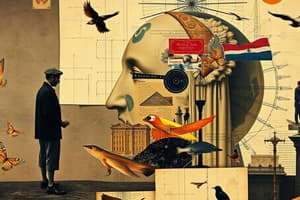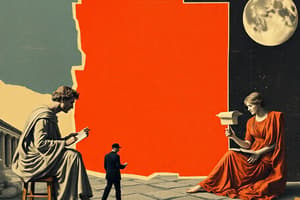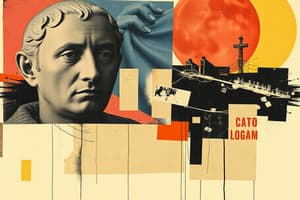Podcast
Questions and Answers
Plato believes that the poet creates the images by seeing the idea.
Plato believes that the poet creates the images by seeing the idea.
False (B)
Plato objects to the reflection of objects in nature.
Plato objects to the reflection of objects in nature.
False (B)
Plato uses the metaphor of a mirror to clarify the relationship between reality and the reflection of the idea.
Plato uses the metaphor of a mirror to clarify the relationship between reality and the reflection of the idea.
True (A)
Plato argues that the poet holds up a mirror to reality and in his work we see the reflection of reality.
Plato argues that the poet holds up a mirror to reality and in his work we see the reflection of reality.
According to Plato, the second class of visible things includes shadows and reflections in the mirror.
According to Plato, the second class of visible things includes shadows and reflections in the mirror.
Plato objects to the reflection of objects in the mirror because it reveals the true nature of the idea.
Plato objects to the reflection of objects in the mirror because it reveals the true nature of the idea.
Plato believes that poetry is a product of true knowledge of goods.
Plato believes that poetry is a product of true knowledge of goods.
Plato thinks that Homer and the poetic tribe are imitators of virtues and other things based on truth.
Plato thinks that Homer and the poetic tribe are imitators of virtues and other things based on truth.
Plato believes that the lack of truth and knowledge is what makes poetry inferior.
Plato believes that the lack of truth and knowledge is what makes poetry inferior.
Plato's theory of mimesis is about the reflection of reality in the mirror.
Plato's theory of mimesis is about the reflection of reality in the mirror.
Flashcards are hidden until you start studying
Study Notes
The World of Forms
- Ensures virtue and goodness remain grounded in a Good that is beyond space and time, eternal and incorruptible
The Theory of Imitation
- Plato uses the term 'mimesis' with multiple meanings and connotations in the dialogues
- 'Mimesis' refers to likening oneself to another in speech and bodily behavior, addressing the lower part of man's soul
- In the context of education, 'mimesis' has pedagogic attributes
The Concept of Mimesis
- Imitations can grow into habits and become a second nature, affecting body, voice, and mind
- Only the imitation of good men acting wisely is allowed
- Plato divides poetry into good or bad, and poets into beneficial or pernicious
Plato on Poetry
- Comments on poetry occur in multiple dialogues, with the most systematic comments in Ion and the Republic
- In the Ion, Socrates cross-examines a rhapsode on the nature of his art
- The Ion is the shortest of Plato's writings, with a simple plan and dramatic interest in the contrast between Socrates and the rhapsode Ion
The Role of the Poet
- The poet creates images neither by seeing the idea nor from more substantive knowledge of the object
- The poet produces nothing but phenomena by holding up a mirror, producing appearance without true insight
- The poet holds up a mirror to nature, reflecting nature but not reality
Plato's Objections
- Objects to the reflection of objects in the mirror, since things are divided into visible and intelligible parts
- The poet imprisons and limits the image, and imitates without knowledge
- Poetry lacks truth and knowledge, leading to its low estate
- Homer and all poets are imitators of images of virtue and other things, but do not rely on truth
Studying That Suits You
Use AI to generate personalized quizzes and flashcards to suit your learning preferences.




